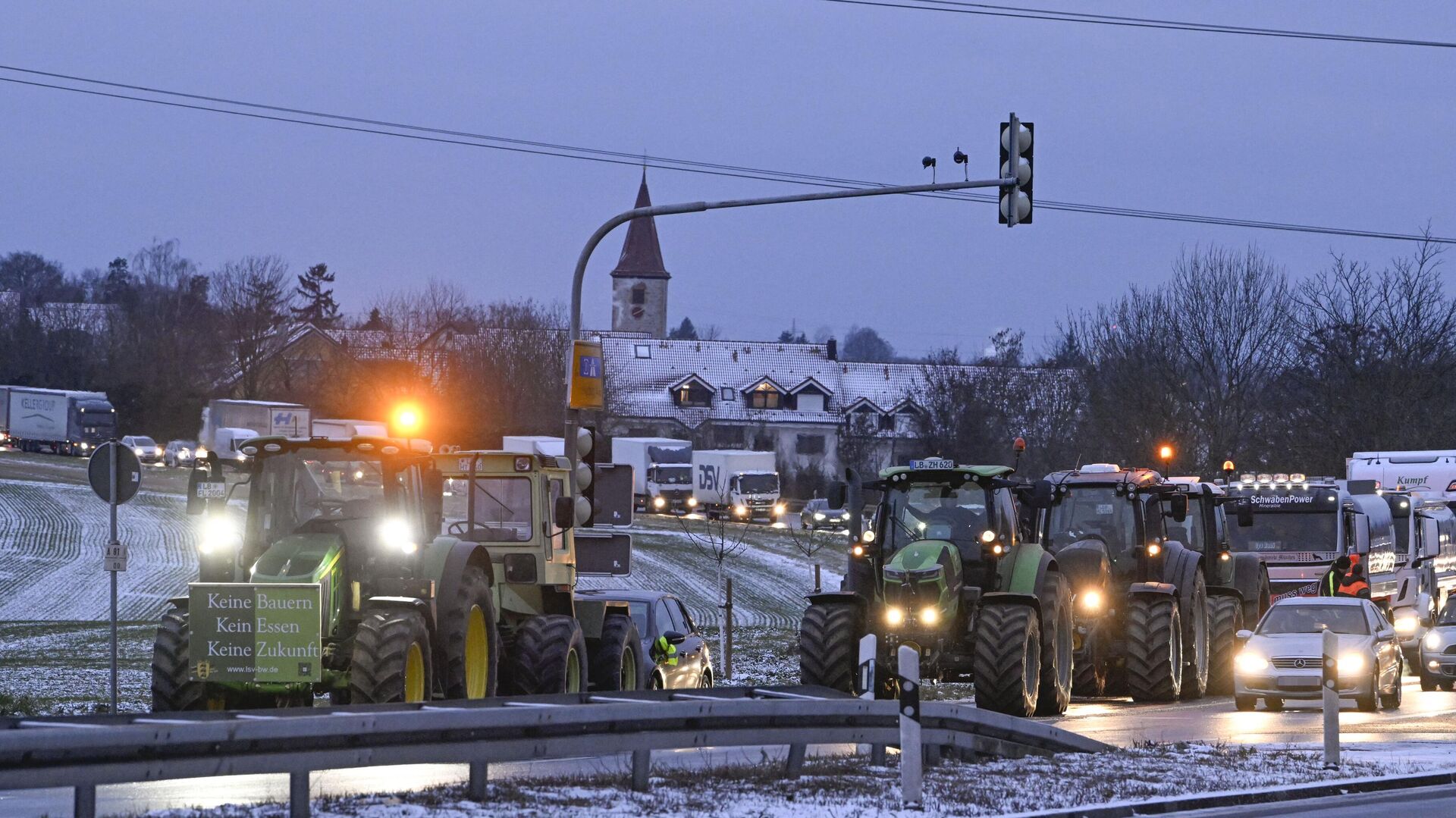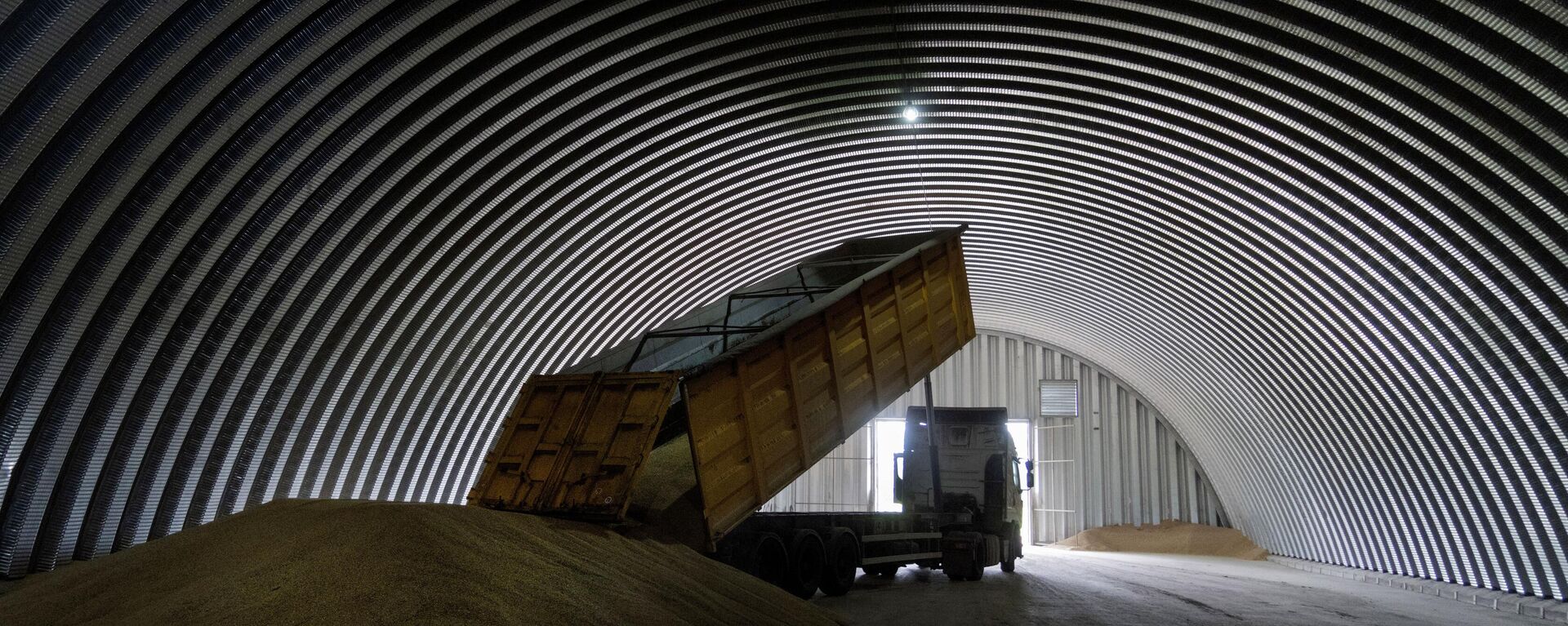https://sputnikglobe.com/20240124/strike-movement-spreads-across-europe-amid-austerity-and-economic-slump-1116367031.html
Strike Movement Spreads Across Europe Amid Austerity and Economic Slump
Strike Movement Spreads Across Europe Amid Austerity and Economic Slump
Sputnik International
Farmers have gone on strike across Europe against cuts to government subsidies and green policies and taxes they say are driving them out of business.
2024-01-24T19:39+0000
2024-01-24T19:39+0000
2024-01-24T19:39+0000
europe
world
ukraine
sanctions
russia
farmers
protests
eu economy
ukrainian crisis
recession
https://cdn1.img.sputnikglobe.com/img/07e8/01/08/1116051024_23:0:3664:2048_1920x0_80_0_0_72aa94fb0a8e402fe380d420f294432f.jpg
Protests have spread from France and Germany to Poland and Lithuania, with angry farmers blocking transport routes over the spike in prices and burdening regulations.GermanyGerman farmers have been in the streets since last December over austerity policies inclding cuts to tax breaks for the agricultural sector and fuel subsidies. On January 8, agricultural workers began blocking roads and highways in the country with tractors. Protestors carried placards the slogans "no farmer, no food, no future" and "when farmers are ruined, food has to be imported."The deteriorating economic situation has prompted the government to gradually cut several decades-old farming subsidies and benefits. Farmers say that it would be impossible for them to stay afloat if they lose that aid and if fair prices are not set for their products.German Rail StrikeNot only have German farmers taken to the streets, but also rail workers. On January 24, train drivers launched a six-day strike. The industrial action is expected to affect long-distance, regional and city commuter services as well as freight transport. This is the fourth time Germany’s GDL Union, with 40,000 members, has kicked off a strike since the end of last year.GDL's dispute with Deutsche Bahn, the German national railway company and a state-owned enterprise under the control of the German government, is over drivers' working time. The union is demanding a 35-hour week, while Deutsche Bahn will only agree to 37 hours. Presently, rail drivers work a 38-hour week. GDL is also advocating for a monthly pay increase of €555 ($600) — 18 percent more than their current wages.RomaniaRomanian farmers and truckers began blocking main roads with their tractors and trucks earlier this month. Their demands are similar to those of their German counterparts. Romanian agricultural workers need lower taxes and fairer subsidies and they are also outraged by the increased cost for heavy machinery insurance. They are also complaining over the EU's climate and environmental policies.Bulgaria, Poland, Hungary, Romania, and Slovakia requested the EU to re-impose import duties on Ukraine grains to provide a level playing field to everyone, the Hungarian Agriculture Ministry announced on January 15.FranceFrench farmers joined their European counterparts in January. They blocked roads across France on Wednesday in a bid to force the government to set fair prices for agricultural goods and ease climate regulations.Many farmers in France have faced a cost-of-living crisis as soaring inflation and the economic slowdown have taken a toll on their incomes. France is the European Union's biggest agricultural producer, making the issue especially sensitive for the nation.France's largest farm union FNSEA recently told the Western press it is planning nationwide protests in the coming weeks.Poland and LithuaniaPolish agricultural workers are planning to block roads in as many as 250 locations to protest EU climate regulations and "uncontrolled food imports" from neighboring Ukraine, Bloomberg reports.Meanwhile over 1,000 farmers with tractors have kicked off a protest in the center of the Lithuanian capital Vilnius. They vowed to continue the protest action until January 26. The farmers' protests in Lithuania started in early January over a hike in the excise duty on liquefied petroleum gas, scrapping tax-breaks on their trucks, the expansion of protected areas and the dairy crisis.European governments reportedly fear the protests spilling over to other regions of the continent and threatening the bloc's "green" climate agenda. The bloc's climate policies and decoupling with Russia over the special military operation in Ukraine has backfired on the European economy, causing similar problems everywhere across the bloc.European media has warned that that right-wing parties may capitalize on the emerging unrest and improve their election chances at the European Parliament elections on June 6 to 9 this year.
https://sputnikglobe.com/20240123/germany-cant-afford-rearmament-let-alone-a-war-with-russia-1116337756.html
https://sputnikglobe.com/20230420/poland-suggesting-that-eu-ban-imports-of-fruits-eggs-other-ukrainian-food---reports-1109691698.html
https://sputnikglobe.com/20240123/one-dies-2-injured-after-car-rams-farmers-barricades-in-france-1116333284.html
https://sputnikglobe.com/20240121/poland-lets-in-fewer-ukrainian-trucks-than-agreed---ukrainian-association-of-carriers-1116297185.html
https://sputnikglobe.com/20231126/rise-of-right-how-ukraine-conflict-and-gaza-war-affect-eus-political-balance-1115214954.html
ukraine
russia
Sputnik International
feedback@sputniknews.com
+74956456601
MIA „Rossiya Segodnya“
2024
News
en_EN
Sputnik International
feedback@sputniknews.com
+74956456601
MIA „Rossiya Segodnya“
Sputnik International
feedback@sputniknews.com
+74956456601
MIA „Rossiya Segodnya“
eu protests, farmer protests in europe, eu inflation, eu recession, eu economic slowdown, farmer strikes in france, farmer strikes in germany, farmer strikes in poland, farmer blocked roads in romania
eu protests, farmer protests in europe, eu inflation, eu recession, eu economic slowdown, farmer strikes in france, farmer strikes in germany, farmer strikes in poland, farmer blocked roads in romania
Strike Movement Spreads Across Europe Amid Austerity and Economic Slump
Farmers have gone on strike across Europe against cuts to government subsidies and green policies and taxes they say are driving them out of business.
Protests have spread from France and Germany to Poland and Lithuania, with angry farmers blocking transport routes over the spike in prices and burdening regulations.
German farmers have been in the streets since last December
over austerity policies inclding cuts to tax breaks for the agricultural sector and fuel subsidies. On January 8, agricultural workers began blocking roads and highways in the country with tractors. Protestors carried placards the slogans "no farmer, no food, no future" and "when farmers are ruined, food has to be imported."
Germany became the only G7 economy that suffered a recession in 2023, according to the International Monetary Fund (IMF). Having severed economic and energy ties with Russia under pressure from Washington after Moscow launched its special military operation in Ukraine, Germany is facing de-industrialization and cost of living crisis.
The
deteriorating economic situation has prompted the government to gradually cut several decades-old farming subsidies and benefits. Farmers say that it would be impossible for them to stay afloat if they lose that aid and if fair prices are not set for their products.
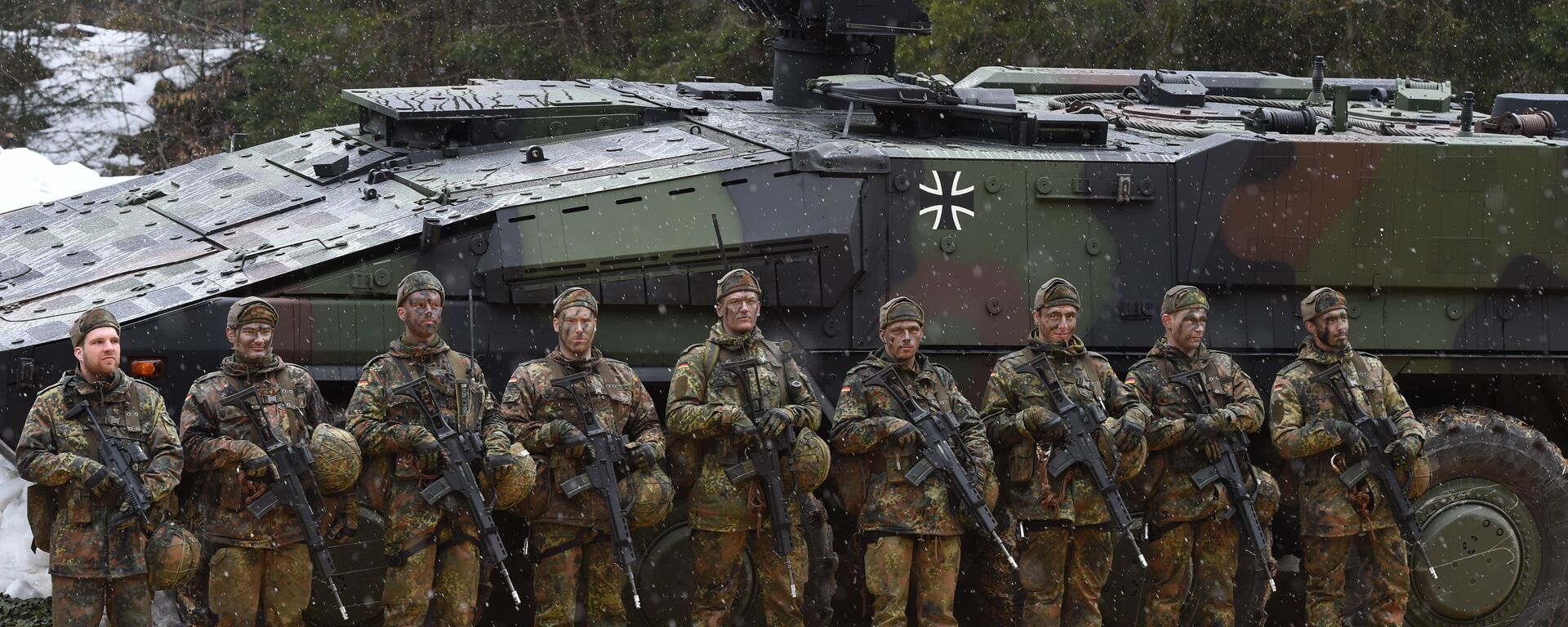
23 January 2024, 18:07 GMT
Not only have German farmers taken to the streets, but also rail workers. On January 24, train drivers launched a six-day strike. The industrial action is expected to affect long-distance, regional and city commuter services as well as freight transport. This is the fourth time Germany’s GDL Union, with 40,000 members, has kicked off a strike since the end of last year.
GDL's dispute with Deutsche Bahn, the German national railway company and a state-owned enterprise under the control of the German government, is over drivers' working time. The union is demanding a 35-hour week, while Deutsche Bahn will only agree to 37 hours. Presently, rail drivers work a 38-hour week. GDL is also advocating for a monthly pay increase of €555 ($600) — 18 percent more than their current wages.
Romanian farmers and truckers began blocking main roads with their tractors and trucks earlier this month. Their demands are similar to those of their German counterparts. Romanian agricultural workers need lower taxes and fairer subsidies and they are also outraged by the increased cost for heavy machinery insurance. They are also complaining over the EU's climate and environmental policies.
Romania is the EU's largest sunflower producer and is among top three producers of corn and soybeans. In May 2023, Romanian farmers together with their Polish and Hungarian counterparts objected to over Ukrainian grain imports, accusing Kiev of price-dumping, and pressured Brussels into agreeing on a ban on Ukrainian foods to Central and Eastern Europe. In September, Romania asked the EU to extend the ban. The lifting of duties on Ukraine foods depressed prices in the bloc, backfiring on the Romanian agricultural sector.
Bulgaria, Poland, Hungary, Romania, and Slovakia requested the EU to re-impose import duties on Ukraine grains to provide a level playing field to everyone, the Hungarian Agriculture Ministry announced on January 15.

23 January 2024, 13:02 GMT
French farmers joined their European counterparts in January. They blocked roads across France on Wednesday in a bid to force the government to set fair prices for agricultural goods and ease climate regulations.
Many farmers in France have faced a cost-of-living crisis as soaring inflation and the economic slowdown have taken a toll on their incomes. France is the European Union's biggest agricultural producer, making the issue especially sensitive for the nation.
Reuters reported that dairy sector workers are particularly frustrated with the French government's anti-inflation efforts, which have undermined EGALIM legislation created to safeguard farm-gate prices. Earlier, in August 2023, French Economy Minister Bruno Le Maire announced that the price of 5,000 products in supermarkets would not rise or would even be reduced.
France's largest farm union FNSEA recently told the Western press it is planning nationwide protests in the coming weeks.
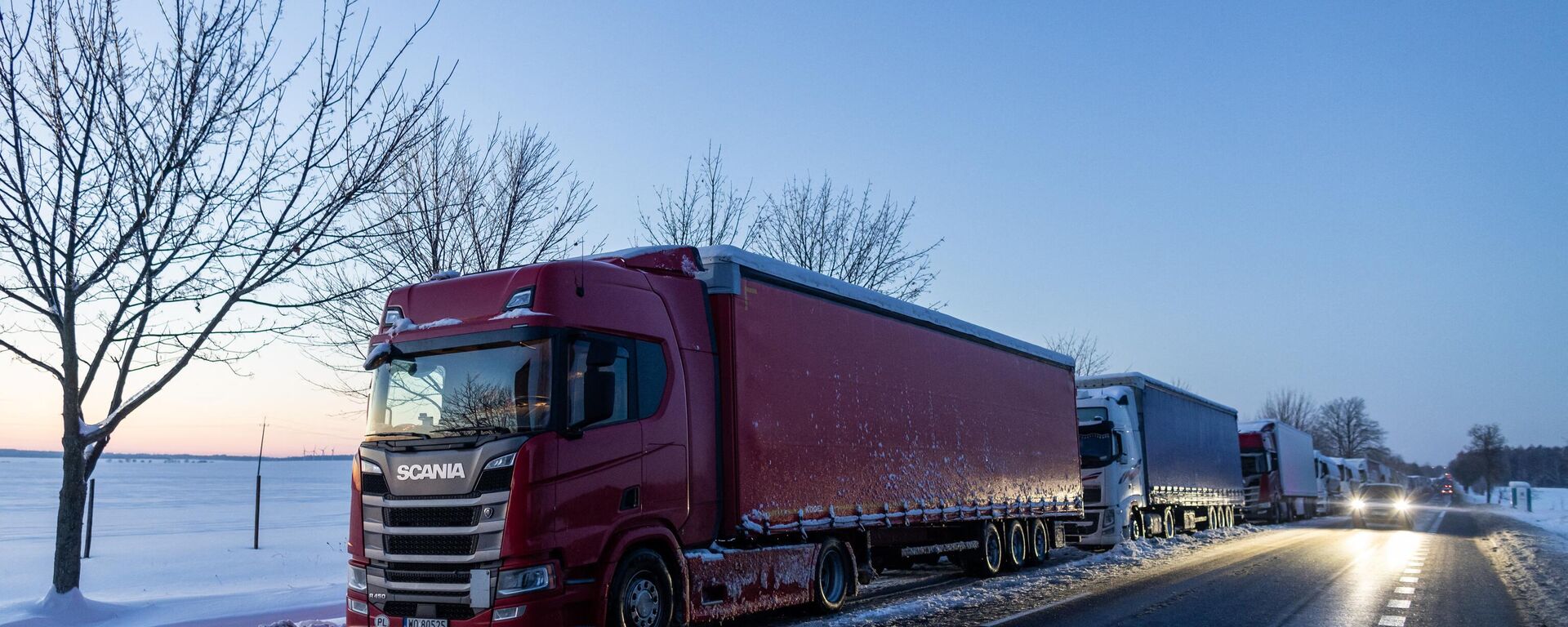
21 January 2024, 11:24 GMT
Polish agricultural workers are planning to block roads in as many as 250 locations to protest EU climate regulations and "uncontrolled food imports" from neighboring Ukraine, Bloomberg reports.
Meanwhile over 1,000 farmers with tractors have kicked off a protest in the center of the Lithuanian capital Vilnius. They vowed to continue the protest action until January 26. The farmers' protests in Lithuania started in early January over a hike in the excise duty on liquefied petroleum gas, scrapping tax-breaks on their trucks, the expansion of protected areas and the dairy crisis.
European governments reportedly fear the protests spilling over to other regions of the continent and threatening the bloc's "green" climate agenda. The bloc's climate policies and decoupling with Russia over the special military operation in Ukraine has backfired on the European economy, causing similar problems everywhere across the bloc.
European media has warned that that right-wing parties may capitalize on the emerging unrest and improve their election chances at the European Parliament elections on June 6 to 9 this year.
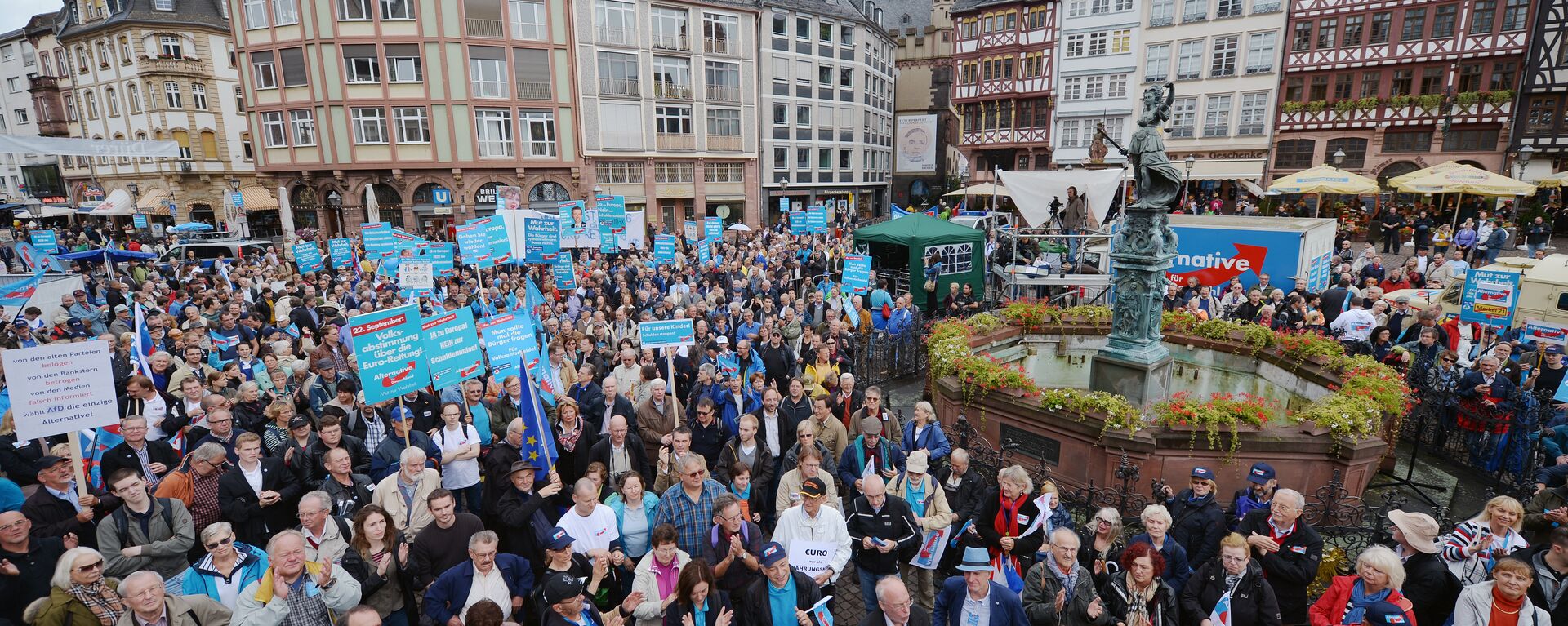
26 November 2023, 12:24 GMT
